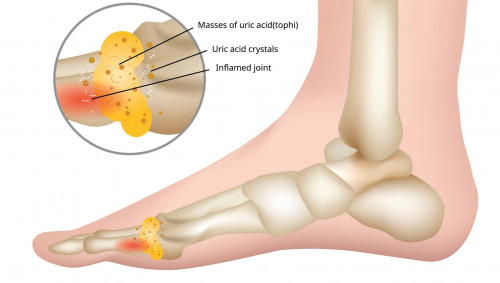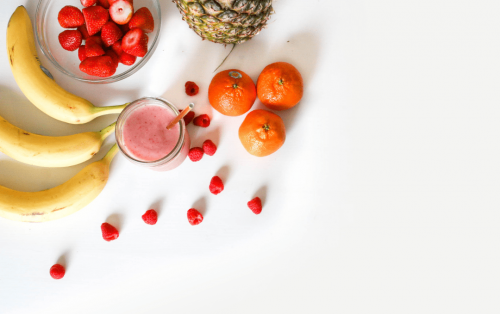Gout is a common disease that can be extremely painful and have long-term consequences for your overall health. There are several triggers that can impact the development of gout, including alcohol use. Here, learn more about the connection between drinking alcohol and gout, and considerations to keep in mind for optimal health.
What is Gout?
Gout is a type of inflammatory arthritis that causes extreme pain in affected joints.1 Symptom flares can begin without warning and linger for days or weeks, and then go into remission, where you are symptom-free for long periods of time, even years. Gout can affect various joints and typically occurs in one joint at a time. It often impacts the joints in the toes, especially the big toe, but can also occur in the ankle, knee, and other joints. Symptoms include:
- Pain, usually intense, begins suddenly and often at night.
- Swelling, stiffness, redness, and warmth in the joint that is affected
How Alcohol Affects Gout?
Drinking alcohol affects gout risk in two main ways:
- Some alcohol (particularly beer) is high in purines, which are then broken down into uric acid.
- All alcohol — including beer, wine, and hard spirits — affect processes in the kidneys that in turn impact how uric acid is eliminated in urine.
Alcohol makes the uric acid be pulled back into the body, with less [expelled] in the urine. This leads to elevated blood levels of uric acid, When uric acid isn’t excreted in the urine, it further contributes to the formation of crystals in joints that cause intense pain and inflammation.
Which Type of Alcohol Is the Worst for Gout?
All types of alcohol affect gout, but the impact on flares and symptoms may vary by type of alcohol, depending on which studies you look at. Some research suggests that beer is especially bad for gout because it contains higher levels of purines that break down directly into uric acid. A 2004 study published in the medical journal The Lancet found that “alcohol is strongly associated with an increased risk of gout,” the study authors concluded.
Can changing your drinking habits prevent gout?
When you have gout, it’s important to keep your uric acid levels as low as possible to avoid a flare-up. Because alcohol increases uric acid levels, many doctors will recommend drinking only in moderation or cutting back significantly.
If you enjoy alcohol, making simple changes to your drinking habits may help avoid future flare-ups. Even if you don’t have gout, avoiding heavy drinking may even help prevent a first-time gout experience.
Is Gout Dangerous?
Gout can lead to complications, although the progress and outlook for the condition can vary between individuals depending on a variety of factors. Many of these factors are malleable and can be effectively managed or treated with medication. While gout isn’t directly life-threatening, it can lead to other major issues, including:
- Infections and damage to affected joints, including deformity.
- Formation of kidney stones, chronic kidney disease, or kidney damage.
- Gouty arthritis is a type of progressive arthritis.
- Greater risk of developing heart problems.
Coping & Prevention Tips
Lifestyle changes can help you cope with gout and may help to prevent attacks. When you have a flare, it can be helpful to rest the affected joint, keep it elevated, and use ice on it for short periods of time. Staying hydrated can also help the flare pass. Managing gout involves taking steps to avoid future flares, and can include many different things, including:
- Maintaining a healthy weight. If you are overweight, losing weight can lower the risk of future flares and reduce pressure on the joints.
- Dietary changes. Staying away from foods high in purines, such as red meat, organ meat, and seafood can help you avoid triggers. Eat plenty of fruits, vegetables, and whole grains. Also, try to avoid eating a lot of fatty or sweet foods. Incorporating more low-fat dairy into your diet can help to lower the number of flares you get.
- Stay away from soda and limit your alcohol intake, particularly beer and hard liquor, which are known triggers for gout attacks. Make sure to drink sufficient water to stay hydrated.
- Moderate levels of low-impact exercises, such as walking, swimming, or riding a bicycle, can help to protect your joints and maintain a healthy weight.
- Avoid cigarettes. If you smoke, quitting is a good idea.
- Regular monitoring of uric acid levels, by monitoring your uric acid levels, you can prevent serious health problems down the road.
For uric acid monitoring, PT Isotekindo Intertama has UASure II Blood Uric Acid Monitoring System that employs advanced biosensor technology and is the first hand-held system for both healthcare professionals and individual users with the convenience of a portable device and easy operation for blood uric acid self-monitoring. This is the 2nd generation of UA Sure products. The following feature and benefits from UA Sure II:
- Comes with a USB port, which makes UASure II Blood Uric Acid Monitoring System data transfer easy
- The blood sample required is small (≧ 1.5 μL), which Minimizes pain during examination because it does not have to stab too deep
- Large memory capacity until 200 memory.
References:
- Americanaddiction.org (2022). Gout & Alcohol: Does Alcohol Use Affect Gout?
- Healthline (2022).What You Need to Know About Alcohol and Gout
- Insert Pack UASure II Blood Uric Acid Monitoring System






